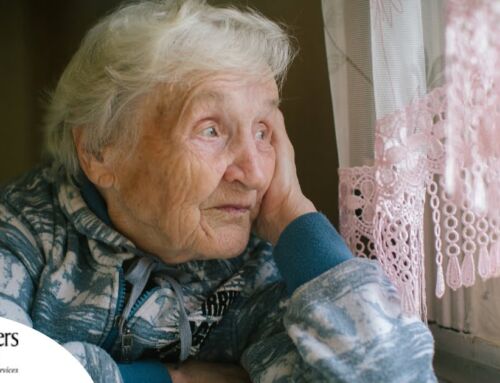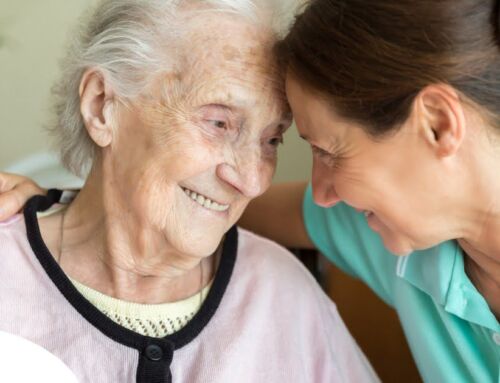According to a recent study from Columbia University, roughly one in ten Americans 65 and over has dementia. Having an aging loved one exhibit dementia symptoms can be a real game-changer for entire families. For family caregivers, understanding the signs of dementia can facilitate timely interventions that enhance their loved one’s quality of life as the disease progresses. Read on to explore the warning signs of dementia and dementia management tips and strategies every family in Boca Raton should know.
What Is Dementia?
Dementia is a broad term encompassing a variety of cognitive disorders that can contribute to the decline of memory, language, problem-solving, and other cognitive functions. While Alzheimer’s disease is the most common type of dementia, other forms include vascular dementia, Lewy body dementia, and frontotemporal dementia.
Each type has unique characteristics, progression patterns, and underlying causes. Once a loved one reaches the latter stages of dementia, maintaining their independence and quality of life can be notably challenging for families.
What Are the Early Warning Signs of Dementia?
Dementia occurs in varying severities, ranging from mild cognitive impairment, where the individual may struggle with memory but still function independently, to severe stages where significant assistance with activities of daily living (ADLs) may become necessary. While early dementia detection isn’t easy, it is essential for effectively supporting loved ones, allowing families to seek professional help and adjust care strategies accordingly.
Here are several early-stage dementia signs to watch for:
- Memory Loss: One of the most common early signs is difficulty remembering recently learned information. For example, forgetting important dates and events or asking for the same information over and over can indicate memory issues. While occasional forgetfulness is normal, consistent memory loss that disrupts daily life may signal the onset of dementia.
- Difficulty Performing Familiar Tasks: Individuals may find it exceedingly difficult to complete everyday tasks that were once second nature, like preparing meals, managing finances, or doing laundry. This lack of control can lead to frustration and a fear of losing one’s independence, making it essential for loved ones to gently and respectfully offer their assistance.
- Time and Place Confusion: Seniors may become disoriented, forgetting dates, seasons, and the passage of time. Additionally, they might forget where they are or how they got there. Understanding this telltale sign can help caregivers create a more stable environment with reminders like visual cues.
- Language and Communication Challenges: Even mild dementia can keep seniors from finding the right words or following conversations. Individuals may also struggle to organize their thoughts, making communication feel frustrating.
- Withdrawal from Social Activities: A noticeable change in interests or avoidance of social interactions could indicate early-stage dementia. As seniors disengage from activities they once enjoyed, their emotional well-being could suffer. Loved ones should encourage socialization while respecting the person’s comfort level, potentially finding new and enjoyable activities to share.
Managing Dementia Symptoms Effectively: Tips and Strategies for Family Caregivers in Boca Raton
Family caregivers can play a pivotal role in managing dementia symptoms, ensuring their loved ones feel supported and respected. Here’s what to include in your dementia management strategy:
Stick to a Routine
Creating and maintaining a daily routine can introduce stability and comfort into your senior’s life. Familiar schedules help minimize anxiety and confusion, making it easier for the individual to approach daily tasks with familiarity. Encourage your loved one to participate in predictable activities, allowing for flexibility based on their needs.
Communicate Effectively
Bridging the communication gap is essential when assisting a loved one with dementia. Start by being an active listener, encouraging your loved one to share their feelings and experiences. Using straightforward language, visual aids, and non-verbal cues can significantly enhance understanding and minimize frustration during conversations.
Use Memory Aids
Utilizing tools such as lists, calendars, and reminders can help individuals manage memory loss. Labeling items around the home, creating visual schedules, and using technology for reminders can help them reclaim a sense of control in their surroundings.
Encourage Cognitive Activities
Use brain-teasing activities, including puzzles, games, and reminiscence therapy, to help maintain your loved one’s cognitive function. Engaging them in appropriate activities can promote social interaction, provide enjoyment, and potentially slow cognitive decline.
Perform Home Modifications
Especially if your loved one lives alone, you must modify the home environment. Start by reducing clutter to minimize confusion and potential hazards. Next, use clear labeling on doors and rooms to aid navigation. Help prevent falls by installing grab bars in bathrooms and adequate lighting in every room. Remove or store sharp objects and toxic substances. Last but not least, store frequently used items within easy reach to promote independence and safety.
Take Care of Yourself
While caregiving can be highly gratifying, it can also be physically and emotionally demanding. As a result, you must prioritize self-care to maintain your health and well-being. Making time for relaxation, exercise, and social activities can alleviate stress and ensure you are ready and able to provide the support your loved one deserves.
Professional Home Care: Dementia Management Reimagined
Once caregiver burnout rears its ugly head, professional in-home caregivers can step in and provide much-needed relief for overworked and overstressed family caregivers.
Here are several ways that a reputable home care provider can help:
Individualized Care Plans
Home care agencies develop tailored care plans that address the specific needs of seniors with dementia and Alzheimer’s. These plans include medication management, structure, and personalized activities to encourage participation and promote cognitive function.
Companionship
In-home caregivers make great companions, which can significantly reduce feelings of isolation and loneliness. They can engage clients in enjoyable conversations and memory-enhancing activities, spending substantial amounts of time with seniors that family caregivers cannot often duplicate.
Assistance with ADLs
Home care services typically include assistance with daily routines, such as grooming, bathing, meal preparation, and laundry. In addition to preserving the client’s dignity, this on-demand support can alleviate some of the burden from family caregivers.
Health and Safety Monitoring
Professional caregivers are trained to notice changes in a senior’s physical, emotional, or cognitive condition. By regularly monitoring health, they can report what they’ve observed to family members or healthcare providers, ensuring prompt intervention when needed.
Relief for Family Caregivers
Most home care providers offer respite care, allowing family caregivers to take a well-deserved break to relax and recharge. This time off is essential for preventing burnout, ensuring that caregivers can continue providing high-quality support and care for their loved ones.
Dignified Home Care Services for Seniors in Boca Raton
Recognizing the signs of dementia and knowing how to manage dementia symptoms can be challenging. When you need assistance, contact CareGivers of America in Boca Raton. As a fully licensed and accredited home care provider, our highly trained and compassionate caregivers can step in and serve as an extended family in your loved one’s home. Designed to restore our clients’ peace of mind, we offer a comprehensive lineup of high-quality home care solutions, including Dementia Care, Companion Care, 24-Hour Care, Light Housekeeping, Meal Preparation, Medication Supervision, Personal Care, and Respite Care.
While assisting clients in Lauderhill, Boca Raton, Aventura, Miami, Fort Lauderdale, West Palm Beach, and Broward, Palm Beach, and Miami-Dade counties, our focus at CareGivers of America is maintaining their quality of life, dignity, self-esteem, and independence. For your added convenience, all our home care services can be individually personalized into an affordable package when and where you need them! To learn more about us and how we help families recognize the signs of dementia, please visit caregiversofamerica.com now.






